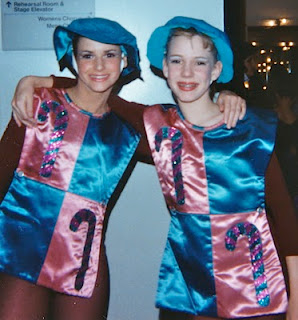What I learned from my children:
-To love the Nutcracker
-How to spot a lie (thanks, Grant, you are the worst)
-All the lyrics to Les Miz (and how they repeat, how the tunes repeat, so cool)
-What the singularity is (“Hello, Dave.”)
-The Sicilian Defense
-Who Frederick Hayek was
-How to make a light saber
-That if you do the crime, you do the time.
-To love the Nutcracker
-How to spot a lie (thanks, Grant, you are the worst)
-All the lyrics to Les Miz (and how they repeat, how the tunes repeat, so cool)
-What the singularity is (“Hello, Dave.”)
-The Sicilian Defense
-Who Frederick Hayek was
-How to make a light saber
-That if you do the crime, you do the time.
 |
| Backstage at the L.A. Nutcracker with Ashley (right) |
Before I had kids, I was a know-it-all. If someone’s house was decorated differently than mine, he didn’t have good taste. Colorful cultural dress was just tacky. Seeing the world differently than I did meant that you hadn’t had the privilege of being brought up right.
Dreadful, I know. At least I didn’t have one of those pointy white hoods. Looking back, I hope I affected some modesty (we learn to do that in the South). Otherwise, to anyone outside my provincial country-club crowd, I must have seemed like a jerk.
Thank goodness for my children. They saved me from myself.
There is no cure for ignorance like a child’s curiosity. By the time you have tried to explain all the things kids ask about, you realize how little you know yourself. If you’re lucky, you catch the bug of their curiosity and you start to wonder about…well, about everything.
Why do the Sunnis and the Shiites hate each other, anyway? Is there dark matter? Was Keynes right, or Hayek? What are the limits of artificial intelligence; after Arnold retires from fighting the California legislature, are we going to have to bring him back to lead another fight against cyborgs who have decided they can do without us?
In law school I learned to assume nothing, to get the evidence and measure it against the legal precedents. But somehow analytical rigor didn’t do much for my understanding of the human condition. Antonin Scalia is supposed to be brilliant, for instance, but to me he is an idiot savant, strictly construing the Constitution without regard to societal changes. That’s what I was, an idiot savant.
When you talk to children, though, they want to know why. Not just what, but why. And you start to wonder why yourself. Pretty soon you’re beginning to understand why those colorful clothes mean so much to people of other cultures. Strange religions and gods begin to make sense, or at least you can see why they make sense to others. The passions in the Middle East seem inevitable when you look into the psyche of those who for millennia have struggled back and forth over those parched lands.
This is empathy, of course: the ability to put yourself in the other fellow’s shoes. I would have said that as a young man I was empathetic---I stopped to help anyone with a flat tire. I gave money and clothes to the poor---but what I did was sympathetic, not empathetic. I pitied the people I helped more than I understood them.
For a long time, Nick sang the songs from Les Miz in the shower every morning. He’s the one who showed me (duh! you say) that the music and the lyrics repeat and circle back among the characters in a kind of musical testament to the ways (“I am of the gutter too,” Javert tells Valjean) in which we are all the same.
Now, when I hear the dying Fantine calling Cosette in from the darkness, or Javert praising the order and certainty of the stars, when I am roused by “Do You Hear the People Sing,” then sobered by “Empty Chairs at Empty Tables,” in those moments when my analytical guard is down and my prejudices and preconceptions have relaxed their grip, I slip inside the characters and see the world as they do.
For that gift, I have my children to thank.
You're beautiful.(not that there's anything wrong with that!)
ReplyDeleteDavid
What a great dad you are!
ReplyDeleteDebby
Can I steal this for my Redbook pitch?
ReplyDelete;-)
And you are definitely a faster learner than I. I still don't have those Les Miz lyrics down.
Lovely stuff.
oh, Mac, you've lightened my soul again! How beautiful this is, the insight that children help us ask why things are the way they are. I've never thought about it this way, but it's so true. Somehow, as we become "grown-up," maybe we have to believe we DO know the answers to questions that are so intricate and worrisome and beyond us. But children help us hold onto the wonder.
ReplyDeleteI can't resist sharing a couple of our youngest (Gabe)'s questions from when he was about 4:
"Why was Zoe [our dog] first a baby?"
"Why are socks slippery?"
"Why do we speak English?"
"Why do we have bones?"
"Why is there darkness and light?"
and my personal favorite; "Why do baboons have red butts?"